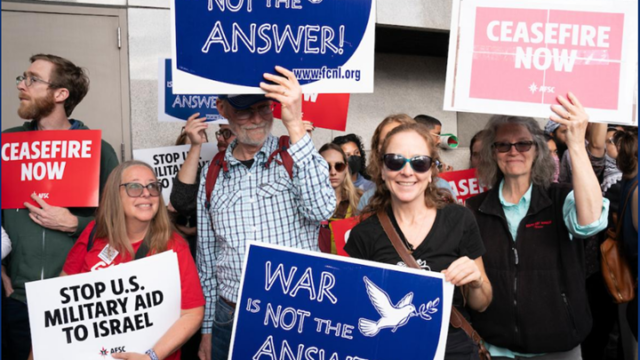

Authorship and thoughts in this story are attributed to the Middle East Collaborative of Philadelphia Yearly Meeting
On October 7, 2023, the world was awakened to the horror of an armed attack in Israel. For those who were not familiar with the ongoing struggles that Palestinians had been experiencing, it felt unprovoked and antisemitic. Certainly, for some, the work to lift up the issue of Palestinian oppression was going to be much harder. And so it has.
Quakers have long advocated for peace and equality, and we have learned that true peace—deep and lasting peace—and structural equality beyond a commitment to the ideal do not come without justice. While we push for a ceasefire now, in the months after the Hamas attack on October 7, and Israeli army, government, and settler responses, we also need to continue pushing for structural changes that will help bring about that more lasting peace we crave.
What had we heard in the news before October 7 of life in Gaza, the West Bank, Ramallah, and Jerusalem? Where can we learn more beyond the terrible details, we now hear nightly about the destruction of Gaza? Mainstream sources have improved their coverage in recent months, but much coverage is still shaped by decades of anti-Arab stereotypes, reliance on Israeli military and Zionist sources, and Christian nationalist sources. If you feel you do not understand the depth and context of Palestinian oppression, you are not alone
As Friends, we have valued the idea of ‘taking away the occasion for war,’ as George Fox wrote in his journal. We thought, perhaps, that the steps taken over the decades by Israel and the PLO were heading in that direction. Many have heard less about the politics and what has shaped the current political reality—the blockade of Gaza, the rise of Hamas, a political party that has succeeded the PLO in power.
Members of the Middle East Collaborative of Philadelphia Yearly Meeting have been engaging with the issues and the people there for decades. Some have worked in relief agencies; others have taught at Ramallah Friends School; some have gone to learn more. We urge connecting with peace organizations with long relationships in the area and following their lead as this crisis continues. Specifically, join a webinar; find prompts to help write to legislators; monthly meetings can join in these efforts.
Leaders in Israel and Hamas have struggled to achieve agreement on a ceasefire and necessary steps to make progress for peace. Our attention to continue raising our voices for peace is critical. Here are some ways we can move forward:
- Read April 12 Joint Statement: Another Future is possible page 3: NOW is the time for action. Bring the statement to your meeting to sign and make plans to act.
- One meeting started by bringing a minute for a ceasefire; it was signed by the meeting, and they realized they needed to learn and do more. Here is what they did.
- Join a local group like Prayers for Peace Alliance
- Join an AFSC phone call or webinar and prepare an action.
- Attend a Meeting for Worship with Attention to Peace in Palestine and Israel @ AFSC on Thursdays… and https://afsc.org/divest?ms=web24HG.
- Or join an FCNL phone call or webinar and prepare an action: Begin or continue a relationship with your congressional representative and share your concern. FCNL https://www.fcnl.org/ can provide contact information for your representative and senator.
- Prepare a visit to the local office with a few of your members.
- Take inspiration and learn of successes to inspire us to act—for instance, what Canadians have done: https://www.justpeaceadvocates.ca/news/
Learn from AFSC latest on Gaza
Start a book group and read essays, history, by or about Palestinians
- Light in Gaza
- Kingdom of Olives and Ashes
- The Hundred Years War on Palestine
The Philadelphia Yearly Meeting Library has some books to borrow. Contact: Librarian@pym.org.
Resources on Middle East Collaborative website
INVITE us to learn more. We have stories to share and a timeline of Quaker involvement. See the MEC page at pym.orgf or more about the collaborative and contact information.
If you missed our presentation at annual session, here is our presentation.
Our work with Christian Jewish Allies for a Just Peace for Israel/Palestine (CJA) and the lessons from Why Palestine Matters add to our ability to address justice for Palestinians and safety for Israel—issues that have been very hard. This group, CJA, includes people who have actively learned, spoken out, and helped uncover a history of the region over the last 100 years that has not been shared broadly. Often, the sharing of this more complete history has been resisted due to the horrors of the Holocaust and the mixed record of Western governments and organizations in intervening to protect Jewish and other targets of Nazism. We hope to share more collaborations with Christian Jewish Allies based on the framework of the Why Palestine Matters curriculum.
NEWS SOURCES: We have found some news sources that are telling more of the story. Here are a few that report more reliable news with a fuller context:
- Mondoweiss – www.mondoweiss.net
- Tareq S. Hajjaj – member of Palestinian Writers Union, Mondoweiss correspondent
- Journalist Peter Beinart – Orthodox Jewish journalist, editor-at-large of Jewish Currents and posts regularly at the Beinart Notebook – https://peterbeinart.substack.com/
- Journalist Emily Tamkin [US Jewish reporter], The Washington Post
- Palestine Chronicle – https://www.palestinechronicle.com/
Be sure to read this piece from AFSC – Building an intersectional approach to confront antisemitism.
Photo accessed 2024-08-22 from fcnl.org